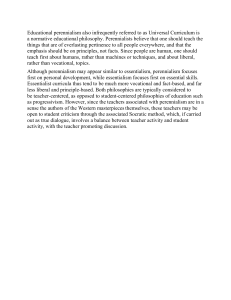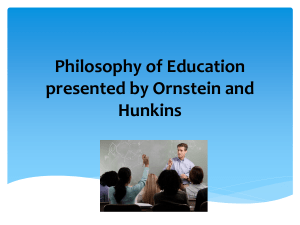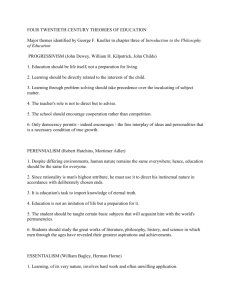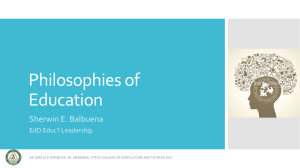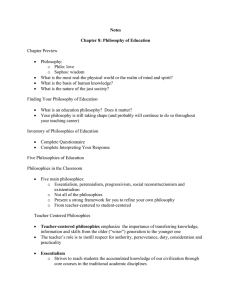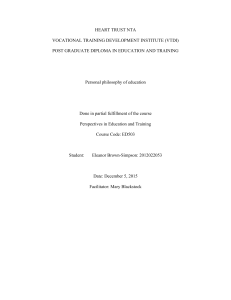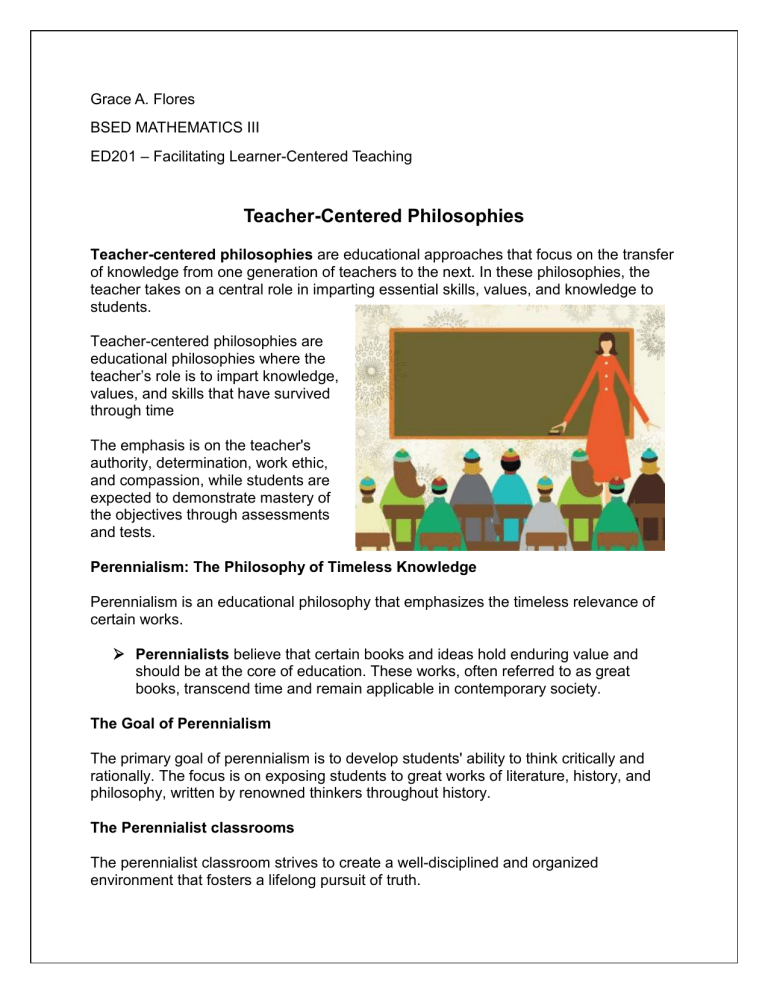
Grace A. Flores BSED MATHEMATICS III ED201 – Facilitating Learner-Centered Teaching Teacher-Centered Philosophies Teacher-centered philosophies are educational approaches that focus on the transfer of knowledge from one generation of teachers to the next. In these philosophies, the teacher takes on a central role in imparting essential skills, values, and knowledge to students. Teacher-centered philosophies are educational philosophies where the teacher’s role is to impart knowledge, values, and skills that have survived through time The emphasis is on the teacher's authority, determination, work ethic, and compassion, while students are expected to demonstrate mastery of the objectives through assessments and tests. Perennialism: The Philosophy of Timeless Knowledge Perennialism is an educational philosophy that emphasizes the timeless relevance of certain works. Perennialists believe that certain books and ideas hold enduring value and should be at the core of education. These works, often referred to as great books, transcend time and remain applicable in contemporary society. The Goal of Perennialism The primary goal of perennialism is to develop students' ability to think critically and rationally. The focus is on exposing students to great works of literature, history, and philosophy, written by renowned thinkers throughout history. The Perennialist classrooms The perennialist classroom strives to create a well-disciplined and organized environment that fosters a lifelong pursuit of truth. Mastery of Content and Reasoning Skills Perennialists place a strong emphasis on mastery of content and the development of reasoning skills. Sequential skill development is prioritized, with an emphasis on reading, writing, speaking, and listening in the early grades. These foundational skills prepare students for the study of literature, history, and philosophy in later grades. Essentialism: The Philosophy of Basic Skills Essentialism is an educational philosophy that prioritizes the teaching of fundamental skills. Advocates of essentialism believe in training the mind and preparing students for the challenges of the real world. This philosophy emphasizes a core curriculum, focusing on subjects such as reading, writing, math, science, history, foreign language, and technology. The goal is to provide students with a solid foundation of knowledge that can be applied in various contexts. The Goal of Essentialism The main goals of essentialism are to instill students with the “essentials” of academic knowledge, patriotism, and character development. Essentialist educators focus on transmitting a series of progressively difficult topics and promoting students to the next level or grade. The focus of coursework in essentialism is to teach the essentials of life, including intellectual knowledge, vocational skills, moral principles, physical fitness, and wellbeing habits. Essentialism advocates training the mind and promoting reasoning to ensure a common culture for all citizens. The Essentialist Classroom In an essentialist classroom, students typically follow a structured schedule, attending different classes throughout the day. The teacher plays a central role, imparting knowledge through lectures, while students take notes and engage in practice activities. Assessments are used to gauge students' understanding and competence. Once students demonstrate sufficient mastery of the material, they progress to the next grade or level. While a specific curriculum is predetermined, teachers have some flexibility in how they deliver the content. Comparing Essentialism and Perennialism While essentialism and perennialism are both teacher-centered philosophies, they have distinct differences in their approach to education. Essentialism focuses on teaching basic skills and core knowledge, while perennialism emphasizes the timeless relevance of certain works. Essentialism places importance on a structured curriculum, teacher-led instruction, and assessments to measure student progress. On the other hand, perennialism values critical thinking, rationality, and the exploration of great works of literature and philosophy. Both philosophies have had a significant impact on education, shaping the way educators approach curriculum design and instruction. Understanding these philosophies can help educators find the balance between imparting essential knowledge and fostering critical thinking skills in their students. Conclusion Teacher-centered philosophies such as essentialism and perennialism provide valuable insights into the role of teachers in education. Essentialism emphasizes the teaching of basic skills and core knowledge, while perennialism focuses on the timeless relevance of certain works. By understanding these philosophies, educators can develop effective teaching strategies that promote both essential knowledge and critical thinking skills in their students. REFERENCE Lynch, M. (2016, August 5). Philosophies of Education: 2 Types of Teacher-Centered Philosophies. The Edvocate. https://www.theedadvocate.org/philosophies- education-2-types-teacher-centered-philosophies/ Gibbs, H. (2021, February 10). 2.5: What is the difference between teacher-centered vs. student-centered philosophies? Social Sci LibreTexts. https://socialsci.libretexts.org/Bookshelves/Education_and_Professional_Develop ment/Foundations_of_Education_and_Instructional_Assessment_(Kidd_et_al.)/0 2%3A_Educational_Philosophy/2.05%3A_What_is_the_difference_between_tea cher-centered_vs._student-centered_philosophies
